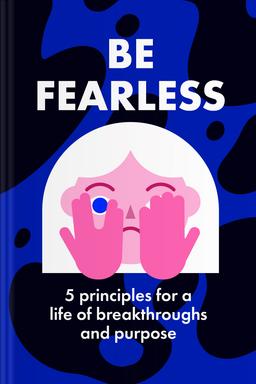Fear holds you back from opportunities, relationships, and personal growth. You know the feeling — that tightness in your chest when you're about to take a risk or try something new. Research by GlobeNewswire indicates that as many as 49% of Americans report that a fear of failure prevents them from achieving or revising their goals.
These seven books about overcoming fear offer practical strategies to face your anxieties and build courage. Authors like Jean Case and Amy Morin share research-backed methods that have helped millions push past their limitations and create meaningful change.
Books about fear
You experience fear in different areas of your life. At work, you might avoid speaking up in meetings. In relationships, you could hesitate to be vulnerable. With personal goals, you talk yourself out of starting before you even try.
Fear serves a purpose — it protects you from genuine danger. But most of your daily worries aren't about survival. They're about potential embarrassment, rejection, or failure. Your brain treats these social fears the same way it treats physical threats.
Books about fear help you understand this response. They show you why your mind creates worst-case scenarios. You'll learn that fear often signals growth opportunities rather than actual danger.
'Fear Is Not the Boss of You' by Jennifer Allwood teaches you to recognize fear's voice without letting it control your decisions. Allwood explains that courage isn't the absence of fear — it's taking action despite feeling afraid. You can acknowledge anxiety while still moving forward.
These books give you permission to feel scared and act anyway. You don't need to wait until fear disappears. You just need better tools to work with it.
Books on overcoming fear
Reading about fear is one thing. Learning to overcome it requires specific techniques you can apply immediately. Books on overcoming fear provide actionable frameworks for building courage.
'13 Things Mentally Strong People Don't Do' by Amy Morin identifies habits that reinforce fear. You might waste energy on things you can't control or dwell on past mistakes. Morin shows you how to redirect that mental energy toward productive action. When you stop these counterproductive patterns, you free up space for braver choices.
'The Big Leap' by Gay Hendricks introduces the concept of your upper limit problem. You unconsciously sabotage yourself when things go too well because success feels unfamiliar or undeserved. This book helps you recognize when you're holding yourself back from new possibilities because you fear outgrowing your current identity.
'Big Magic' by Elizabeth Gilbert reframes your relationship with creative fear entirely. She suggests treating fear like a passenger in your car — it's along for the ride, but it doesn't get to drive or choose the destination. You acknowledge its presence without giving it decision-making power.
'Be Fearless' by Jean Case offers five principles for bold leadership. Case shares stories of people who took calculated risks that changed industries and communities. You'll see that fearlessness isn't recklessness — it's about making failure possible while pursuing what matters most to you.
These books on overcoming fear provide practical steps to take today. Start small. Pick one area where fear has been winning. Apply one technique from these authors. Build your courage muscle through consistent practice rather than waiting for a breakthrough moment.



